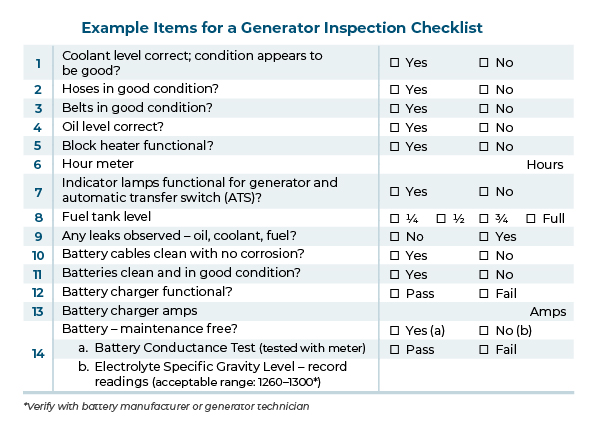BLOG
Keep the Power On: Generator Inspection Checklist
- Blog
- »
- Ambulatory Surgery Center: Generator Inspection Checklist
August 23, 2023
At any ambulatory surgery center, the list of essentials should have electricity at or near the top. And when the electricity is not flowing from the power utility, the facility manager must have a backup source of electricity generation ready to go.
In the Accreditation Commission for Health Care (ACHC) Ambulatory Surgery Center Standards Manual, Standard 16.05.03 for Generator Inspection is a critical standard for maintaining a reliable generator and emergency power system. Many facilities use generators for emergency power, and others use batteries. For facilities equipped with emergency generators, the generator inspection standard describes a weekly inspection of the generator, a battery test, and an annual fuel quality test. This post will go into more detail to help you build a routine for sustained compliance.
Conducting the Weekly Inspection
The weekly inspection of an emergency generator must be documented, typically in a log or checklist. A checklist may look something like this:

The generator engine is a mechanical device that contains components that wear over time – including the battery, hoses, belts, and even light bulbs telling the device’s status. Identifying something as simple as a coolant or oil drip could prevent a failure or even more costly repairs if the leak is not detected. A visual inspection can provide early warning signs of a potential problem, prompting action that could prevent a failure when you need the system the most.
Emphasizing a Crucial Test
The battery test is the most common omission on the weekly inspection, and yet it is the only “test” required by the standard.
- The conductance test is the easier of the two. It is completed with a meter clamped to the two terminals of the battery, and the meter does the test.
- The specific gravity requires a little more “hands on” with the battery. The covers for the cells are removed, and a tool is used to suction a small amount of the water from the cell and automatically show a reading – then the water is released back into the battery.
Although both types of batteries are acceptable, many organizations are shifting to maintenance-free batteries, in part because of the testing simplicity.
Verifying the Fuel Is Safe to Use
Lastly, Standard 16.05.03 includes a requirement for an annual fuel quality test. Referring to the American Society for Testing and Materials (ASTM) Standard Specification for Diesel Fuel Oils, the standard states:
“A fuel quality test must be performed at least annually using tests approved by ASTM D 975 2 standards. Fuel samples are often collected and tested by a third-party lab.”
This test is to validate that the fuel does not have contaminants such as water or other debris that would compromise the reliability of the generator. Typically, this can be arranged to be done when your vendor is performing a scheduled service.
Tips for Compliance
A generator is a crucial piece of equipment that you hope to never use. But when you need it, the generator must function properly. Regular inspection is essential.
- Make the inspection a scheduled activity – on the same day of the week and at about the same time.
- The introduction to the Life Safety Chapter includes a definition of times:
Weekly – The activity is performed and completed anytime during the calendar week.
- The introduction to the Life Safety Chapter includes a definition of times:
- Assign the task to the same person. The consistency builds historical knowledge of what is “normal,” making it easier to identify when something may not be right.
- When something is identified as not right, document the issue on the log or checklist and arrange for further inspection by the vendor maintaining the equipment.
- The visual inspection can be completed by someone with little generator experience, and this task is often performed by an ambulatory surgery center nurse or tech.
- An in-service by the vendor maintaining the equipment on the inspection process is recommended.
- To meet the fuel quality test requirements, include the language from our standard in your request to the vendor performing the test.
Ready to Assist
ACHC is here to help. If you have questions or wish to access the most recent ACHC Ambulatory Surgery Center Accreditation Standards Manual, contact your Account Advisor or email us at customerservice@achc.org.
 Accreditation Commission for Health Care, Inc.
Accreditation Commission for Health Care, Inc.